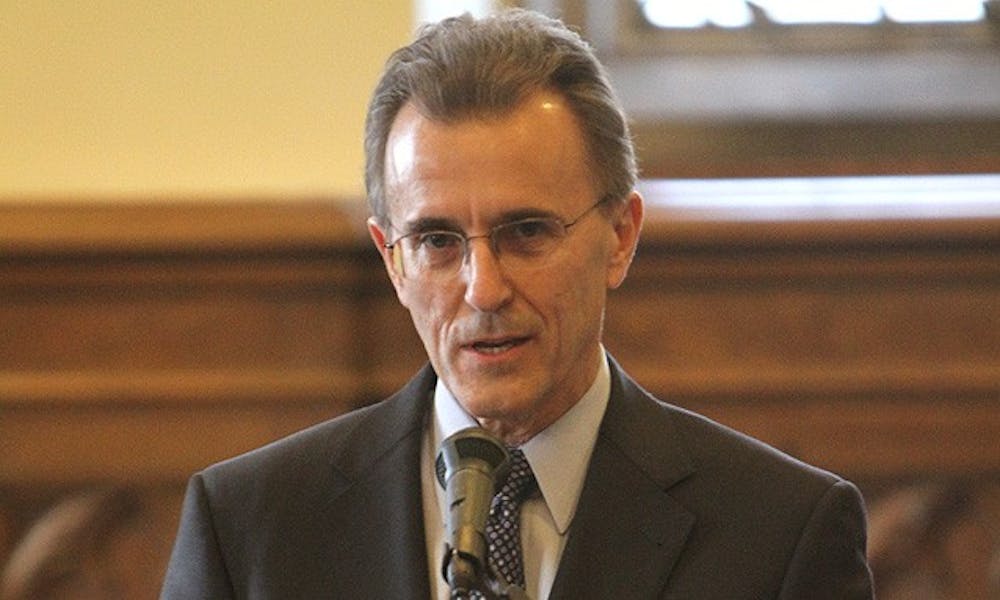The Duke community got a reminder Thursday of the importance of higher education—and the many difficulties surrounding its success.
Eduardo Ochoa, assistant secretary for postsecondary education in the Obama administration, spoke about the future of American higher education to an audience in the York Reading Room Thursday night as part of the lecture series “Re-imagining the Academy.”
Ochoa began the presentation by outlining the benefits of President Barack Obama’s education plan, which centers on increasing the number of educated adults. By focusing on higher education as a national issue, Ochoa said America can stay at the forefront of global competition, enhance the upward mobility of minority groups and strengthen the “civic fabric of our democracy.”
“President Obama’s education agenda is a key element in his strategy for restoring America’s global competitiveness... in order to start that agenda we must make the United States the most educated country in the world by the year 2020,” he said. “Specifically, this means having the world’s highest proportion of college graduates and increasing the proportion of adults with certificates or degrees from 40 to 60 percent.”
The biggest immediate challenge facing higher education is capacity, Ochoa said. Americans must figure out how to dramatically increase the number of graduates per year while maintaining high quality institutions in the United States, he noted, adding that given the high cost of attending both private and public institutions this will be especially difficult.
“Private institutions have raised tuition to levels that have prompted serious concerns about affordability,” Ochoa said. “Most public institutions have also raised their tuition by large percentages... in response to reduced support from the state. Despite these increases, tuition covers on average only about 30 percent of the full cost of college education.”
In light of this, Ochoa explained that Obama’s “landmark” investment in Pell grants, the largest federal scholarship program, will be a centerpiece in his proposal to ensure that more Americans enroll in college.
Ochoa also described the need to take advantage of advances in cognitive science and brain research and apply it to the “reinvention of the learning process.” He pointed out the inefficiency of the current lecture model and said professors should devote classroom time only to highly interactive processes, leaving straightforward learning of facts to individual study time or videotaped lectures.
Increased public scrutiny of higher education and competition from the Bologna Process—an initiative in Europe that regulates academic degree and quality assurance standards—was another challenge Ochoa said the Obama administration’s education program will have to overcome.
“National discourse about higher education will have to undergo major change,” he said. “Higher education will have to speak to the nation with one voice... [It] will need to commit itself to creating a culture and dynamic of continuous productivity and improvement.”
Doug James, assistant dean of academic affairs for the Graduate School, praised Ochoa’s suggestion that higher education institutions come together to create a shared diagnosis of the problems facing post-secondary education in order to provide an outline of issues that individual institutions can then address on their own.
“I appreciated [Ochoa’s] encouragement for the higher [education] community to take leadership on these issues,” James said. “It’s not a goal for the federal government to dictate the solution.”
Akshatha Kommalapati, a freshman, said she liked the inside perspective Ochoa offered, adding that his speech made her realize that there are flaws in higher education, despite the elevated reputation of institutions such as Duke. She said, however, that she was somewhat skeptical of the Obama administration’s plan to focus on increasing graduation rates.
“I see something flawed in saying that graduation rate is equal to success,” Kommalapati said. “I think there are other measures of success that we could be looking at more closely.”
“Re-imagining the Academy” is part of a five-part lecture series, sponsored by Duke’s Bass Society of Fellows, a group of faculty who “seek to connect students and faculty in innovative ways” according to the website. Ochoa is one of five national experts that will speak at Duke this Spring about the American collegiate experience.
Get The Chronicle straight to your inbox
Signup for our weekly newsletter. Cancel at any time.

